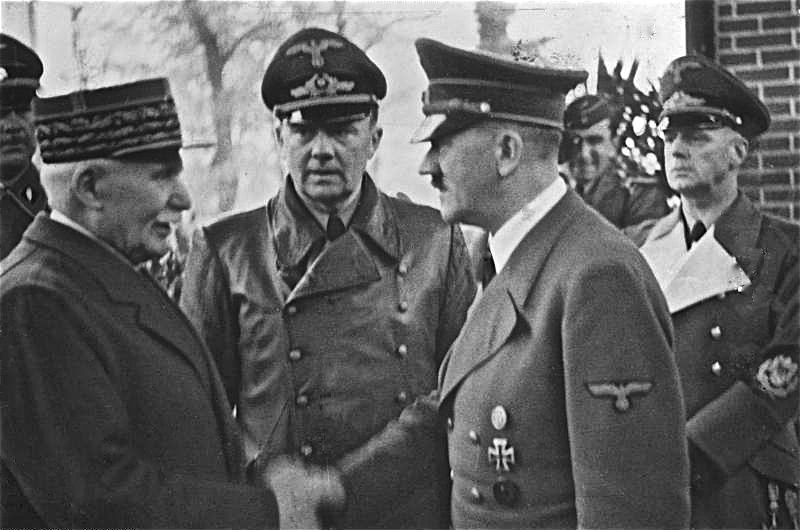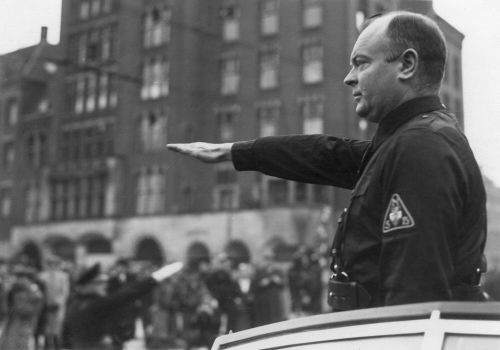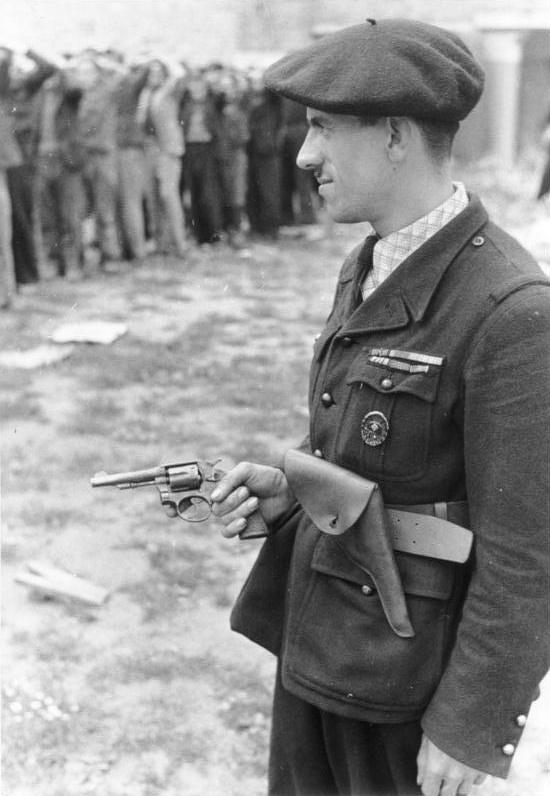Finally saw The Prime of Miss Jean Brodie last night. Maggie Smith, gorgeous locations, etc. It seemed a rather nothing story about an incredibly irritating Scottish teacher and her perfect little students. La creme de la creme she called them. She worshipped beauty, art, perfection, punctuality.
It began to get more interesting. A few plot twists and character revelations developed–-lust, weirdness, disturbing intimations of a warped sexuality. Then slowly she revealed a fascination for fascism. First in hints. A mention of Mussolini. A true Roman she told her students. The romantic definition of hero, the Shining Hero, something long since lost to us viewers in war and compromise and threats of nuclear annihilation. Finally she revealed herself as an out and out Fascist sympathizer. She showed the class slides of a holiday in Rome, a plaza full of uniformed Fascisti. She mixed with them, she said. They had excited her. She nearly panted at the memory. She remembered exactly what she’d been wearing. Somehow her own perfect attire had matched their perfect uniforms. That startled me. Fashion and fascism. How her personal Romantic ideal and the massed Fascist Ideal blended perfectly. Their muscularity and her femininity. Her sex, their power. Etc, etc.
Come the Spanish Civil War the man of the hour became Franco. Oh she could go on about Franco. Near to swooning. I felt an automatic revulsion. We forget now that as many westerners supported the Nationalists as supported the Republicans, people like Evelyn Waugh, J.R.R. Tolkien, Salvador Dali, Wyndham Lewis and (of course) Ezra Pound. Even Gertrude Stein. Miss Brodie’s sympathies would not have been so shocking back then. Perhaps not really shocking at all. No more shocking than those enraptured by Stalin, perhaps even less so. Communists promised revolution and purges. Il Duce promised order. Brodie, we are told (by one of her skeptical students), was quite vocal about her sympathies. It became part of her curriculum. The humanities and fascism blending seamlessly. Her creme de la creme becoming perfect little fascists, she hoped.
They didn’t, except for the simple, suggestible one who, swept up in Miss Brodie’s excitement, made for Spain to join her brother fighting for the Nationalists. The poor thing was machine gunned at the French border. Miss Brodie showed little remorse, as the girl had died for the cause, for the new order. A silly eighteen year old girl meeting a glorious death. A heroic death. Hints of ancient Greece. You and I know it was a squalid ugly death, terrifying, an utter waste. In my head I heard her screams. Miss Brodie’s other students, the poor girl’s friends, knew better as well. (Indeed we find out later that the dead girl’s brother was fighting for the Republicans, something that had never occured to Miss Brodie.)
By this point the movie had slowly, subtly turned creepy, a fascinating look into just how high minded intellectuals bought into the Fascist ideology. How Mussolini and then Hitler had so many admirers in England, in Europe, throughout the Western world. And just how insidious a thing it was, this fascism, how it could mix with art and poetry and perfection, co-opt Romantic ideals, send middle class kids off in shiny uniforms to conquer and gas and execute and massacre without compunction, leaving tidy notes of how many were killed that day, how many men, women and children, and the inventory of what they left behind, hats, hair, overcoats, gold teeth.
We think of Nazis as brownshirted thugs, but the SS took the best and the brightest. There were more brilliant minds in the Reichssicherheitshauptamt than ever joined the German resistance, many times more. Fascism in all its forms–-Italian, German, Spanish, Romanian, Hungarian, English, all of it–-was fundamentally an intellectual movement. A middle class movement, rooted in universities. Indeed, deep down it had begun in poetry and art. Italians shocked into a new reality, hard and unyielding, by the lunacy of the Great War. As the old world destroyed itself then, empires fell, monarchs executed, tradition and history tossed out the window, the world seemed divided between the deary proletarian future of Bolshevism or the beautifully limned and muscular Fascism. I can’t fathom the appeal at all, that thing that sent chills up young fascist spine, made the hair stand up on their arms, rushed the blood to the brain and loins. But you can see it in Miss Brodie, in her prime, remembering the musk of young rippling fascists on parade and taking unsaid fantasies with her to bed that night on a Roman holiday.
It took total annihilation to rid the world of Fascism. We lopped them off like a gangrenous limb. We hung the thugs and the intellectuals by the neck until dead or pulled their lifeless heads out of their kitchen ovens. We shot down Hitler Youth in their suicidal charges. We jailed nazi functionaries for years and put Ezra Pound in a cage. The trials were endless and humiliating, The denazification more so. Hitler shot himself in his bunker to avoid Mussolini’s fate dangling from a meat hook. Only Franco, smart enough to stay out of the War, survived the collapse of fascism, isolated and silent. Fascism as a living, growing ideology was dead.
Or so we thought. Some Nazis escaped and helped keep the idea alive in South America. Peron seemed fascinated by fascist demagoguery, Pinochet goose stepped with the best of them. But that was a more Latin American thing, more Franco than Italian, devoid of Nazi racial theory and efficiency, their armies incapable of anything but parades, torture and repression. But it’s the idea of fascism that remained in Europe. Some strangely replicating meme that grew from the wreckage of fascist empires. That weird, warped romance, the thuggish hero, the big black shiny boots. The websites full of hate and purity and uniforms and alternative history, A reich that will rise again. There aren’t many of these new fascists–they’ve come nowhere near to seizing power anywhere–but they are there, vocal and obvious and scary. In milder form they’ve influenced elections in France. In savage form they’ve made headlines in Greece. They’ve infected football crowds in Italy and even, shockingly, held rallies in Moscow complete with placards of Adolf Hitler himself. I ask myself just how warped a Russian must be to idolize the very man who tried to exterminate them.
Now we’re told that nazi sympathizers pitched in and helped depose the old communist regime in Ukraine, much to the delight of Russian propagandists. If so, that would be the first constructive thing that fascists have done since their post war re-emergence. And what does that mean? I wonder if we’ll ever rid ourselves of the romance of fascism, if it will ever go away. Will it take a generation or centuries? Perhaps, like cancer, it’s built into the very DNA of European civilization, and it will never go away. Perhaps it will even come into intellectual fashion again, with Miss Jean Brodies teaching it to the creme de la creme.
Oh, the movie. It was good. It really was. I thought I was going to hate it, but I couldn’t tear myself away. Maggie Smith was splendid, of course. So were several of the girls. And the artist, though his lechery has not aged well since 1969. The scenery was gorgeous. And if the dialog was oh so precious in too many places, perhaps it might not be to a viewer in Great Britain. At least I told myself so. And yes, it’s utterly ridiculous to reduce a movie review to a tangent on fascism. There was much more going on. I certainly missed the point of the story. But I hadn’t really. It’s just that it was Miss Brodie the fascist that bothered me as I watched the movie. And still bothered me this morning as I drank coffee and listened to the rain, bothered me enough to write this. What an oddly horrible world it must have been where teachers taught fascism with art and etiquette and knew in their hearts they were right.
(Originally posted in 2016 on BricksPicks.com as “The Prime of Miss Jean Brodie”.)







